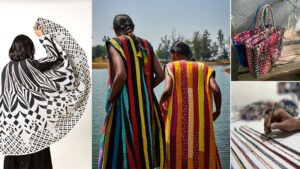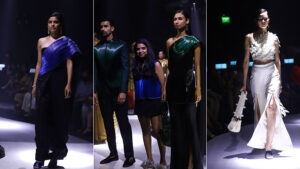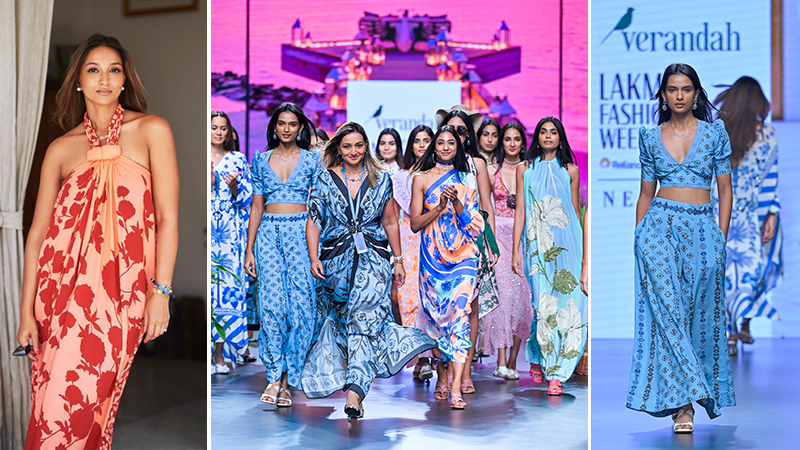When you think experimental, the leading name that pops up is Rimzim Dadu and her engineered saris that have found global fame. “There is no choice left at this point but to change mindsets. We have exhausted the environment, and it is becoming evident that we need to make amends. As entrepreneurs this reality is even more pronounced and if we don’t take a lead then who will?” she asks.
The best thing you can do for the planet is to produce less and to produce only with meaning and love, especially when it comes to fashion which is not a basic need. “We have stopped following the traditional fashion calendar of four collections in a year. We have tied up with professionals who guide us on how to up-cycle and recycle our waste and we’re close to achieving a 100% plastic-free packaging solution. These are only very tiny steps; we want to eventually cut the carbon footprint of sourcing our raw material, and that is something we are working towards actively,” she adds.Styles come back, and Dadu gets inspired by older work and tries to refresh pieces or see them with fresh eyes. There is no reason to waste material or designs, but there is a sense of connection we have with everything we have ever done. “I use this concept for my fabrics, using metal to make thread is the premise of my craft and it is everywhere, I will keep making it new in some way,” she says.
Currently, Rimzim is working on evolving couture techniques and processes while refining existing techniques. “I feel it is important for us creatives to take a break from this constant cycle of coming up with something new. We can bring about a change by being conscious. We need to stay updated with the latest in production technology and adherence to codes of ethics when it comes to environmental conservation,” she concludes.

Meanwhile, Anjali Patel Mehta’s label Verandah raised $1.2 million in funding from Mike Novogratz (Galaxy Investment Partners), Neeraj Arora (formerly WhatsApp), Lydia Jett (Softbank) and PDS Venture. And this is because the world is moving towards the concept of sustainability and her label channels the philosophy of treating the planet right. “Sustainable design has to be ingrained in every aspect of production — whether it is fashion, industry or machines…even tools; it must control all ends,” says Anjali.
“I also believe in transparency and data-mapping, as well as full disclosure of the processes involved,” adds Anjali, who left her job as an investment banker and started her label in Goa, primarily swimwear during the pandemic. Besides cruelty-free clothing, she is into tiger conservation, biodiversity, using close loop processes for textiles, recyclable methods, making filaments from plant waste and renewable wood cellular sources in a tie-up with Australian company Lenzing for eco- friendly fibres.
“We have testing certificates for every single batch we produce. We moved away from silk…difficult to stitch, but it is fully biodegradable, branded as Cupro, and will disintegrate in a landfill in 2-6 months,” she adds.
Verandah, which launched eleven years ago, is plastic-free as they use biodegradable plastic for packaging. Even the tape is sustainable, a practice only two other brands in India follow. Shipping partners are carbon neutral and Anajli is happy to pay more for this.
“We recycle all post production waste into several products — accessories, home wear, use-in collections, making timeless pieces, reproducing old collections, make small batches, even our cutting waste,” she explains, adding the first batch is ready.

Another initiative is to plant one tree which the brand does in Assam for every piece purchased even if it is done globally through the brand’s online store. “The biggest coup of all is when next month Verandah will get the ‘Butterfly’ certification for sustainability – a globally respected award for luxury brands, retailers and suppliers that meet the highest environmental standards,” she adds.
She also wants to experiment with mushroom and pineapple leather-use alternatives to produce mindfully. It is all about innovation around material chains, and she retails from Bergdorf Goodman too as they have a ‘conscious edit’.Pratyush Kumar of the label Pieux, believes consumers demand eco-conscious products, and companies are compelled to adopt sustainable practices for competitive advantage, and ethical responsibility. “We’re committed to an ethos by integrating recycling, up-cycling, and modularity into our processes, fostering circularity,” says Pratysuh.
Modular footwear, eyewear, and garments, ensures versatility and longevity, plus use of sublime prints with AZO-free dyes represents, an eco-friendlier alternative. “Collecting damaged garments like sarees, shirts, and blazers, we transform them into new, valuable products without compromising on excellence. By up-cycling these items, we breathe new life into old materials, ensuring their reimagined form maintains the highest standards,” he explains.
Pieux’s footwear introduces modularity, enabling interchangeable upper parts for extended use. While the eyewear is in beta, it boasts modularity, allowing all parts to assemble seamlessly via 3D printing—a zero-waste production method. “We’re venturing into weaving and print-based crafts, aiming for global appeal while preserving the essence of Indian craftsmanship,” he says.
Jaipur-based Bhaavya Goenka, founder of Iro Iro, says the term sustainable means to go on. If we add the context of environment, culture and society, then it would mean to sustain that context. With the climate crisis making itself visible and poisoning our lungs, it becomes imperative for us to act.

“I act through textiles. We source textile waste from various clusters and industries. All these off-cuts have been cut into tiny scraps and tediously sewn back together to form a linear yarn, then hand-woven into fabric. We also naturally dye our yarns, and through the age-old craft of Kantha patch old pieces of fabric into a new textile story,” says the young and talented designer.Sourcing begins from textile waste off-cuts from garment factories and kabadi markets. All these offcuts have been cut into tiny scraps and tediously sewn back together to form a linear yarn. Through his latest collection Pyaar, Goenka found love in grandfathers’ coats, mothers’ scarves, grandmothers’ saris, fathers’ jumpers, and friends’ t-shirts.
“I am excited that we will be taking our DIY project – zero to Iro Iro forward in the coming months, and collaborating with a movement artist, pattern-maker and artisans. In this project, we design garments as puzzles on different systems of joinery – knotting, buttoning, and sewing, presenting three levels of progression,” she confirms.
Iro Iro was chosen as one of the nine brands from all over the world (and the only brand from India) by an international jury and won a grant by the UN to participate in Fashion Open Studio at COP26.
Pune-based Karishma Shahani Khan, an alumnus of the London College of Fashion, founder of clothing label Ka-Sha, has her aesthetic deeply rooted in mindful practices to create clothing that focuses on functionality in her homegrown label, Heart to Haat, which was inspired by the very indigenous ideology of reusing, repurposing, and self-sustenance.
“Post pandemic people have become quite sensitive to what they are consuming as they look inwards; chaos helped us re-analyse what we actually need,” says Karishma.
Artisanal techniques and material innovation must be more collaborative as a design community. Everyone cannot be 100 percent sustainable. Educating the consumer in different ways on sustainability is important.

“For us as Ka-Sha, substantiality is not about fabrics, or dye or materials, it is a larger picture, it’s about people and the environment,” she adds..
Pot Plant Clothing’s Resham Karmchandani and Sanya Suri harbour a deep love for traditional textiles and time-tested hand-me downs, upholding eco-living by touching base with various aspects of sustainability from craft to repurposing to try and minimize the carbon footprint and bring eco-fashion back in routine life.
“We just have this planet, but awareness is absent. As a company, we follow zero-waste, the fabric is not wasted, scraps are up-cycled, or we send it to a brand that works with scrap. We follow sustainable production, we are a made-to-order brand with a primarily online presence, so we are not feeding into over consumption,” says Resham.
They work exclusively with Indian craftsmen in slow fashion, and teach customers about what they are wearing. Fabrics are natural and chemical-free dyes are used. Garments last for a longer period. “We offer easy separates; you can match with existing clothing. We have rich textiles with surface ornamentation.”
“Translate that craft into a language that people from all age groups understand, for example what we have done with Bandhani. It is not for wedding-wear or saris; we make clothing that is perfect for corporate wear, and everyday wear,” she adds.


Leave a Reply